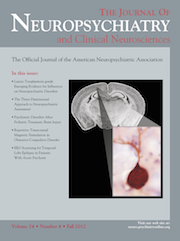The Effects of Comorbid Obsessive-Compulsive Disorder and Attention-Deficit Hyperactivity Disorder on Quality of Life in Tourette Syndrome
Abstract
Tourette syndrome (TS) is a complex neuropsychiatric disorder affecting patients’ quality of life (QoL). The authors compared QoL measures in young patients with “pure” TS (without comorbid conditions) versus those with TS+OCD (obsessive-compulsive disorder), TS+ADHD (attention-deficit hyperactivity disorder), or TS+OCD+ADHD. Age and scores on scales assessing tic severity, depression, anxiety, and behavioral problems were included as covariates. Young patients with both comorbidities exhibited significantly lower Total and Relationship Domain QoL scores, versus patients with pure TS. Across the whole sample, high ADHD-symptom scores were related to poorer QoL within the Self and Relationship domains, whereas high OCD symptom scores were associated with more widespread difficulties across the Self, Relationship, Environment, and General domains. Significant differences in QoL may be most likely when both comorbidities are present, and features of OCD and ADHD may have different impacts on QoL across individual domains.



